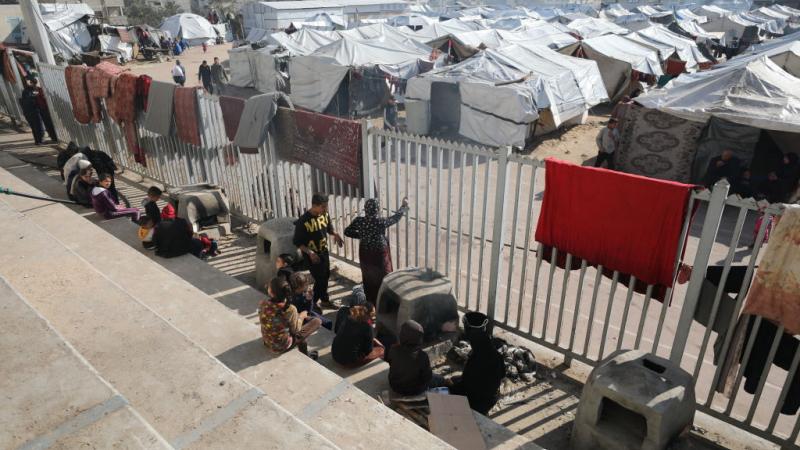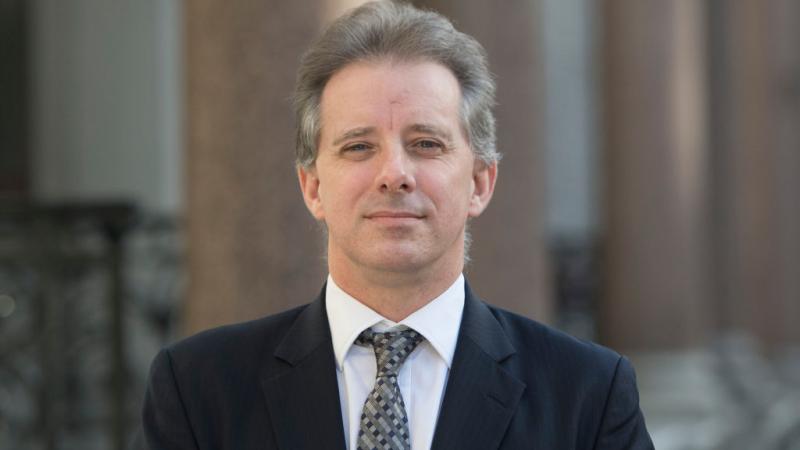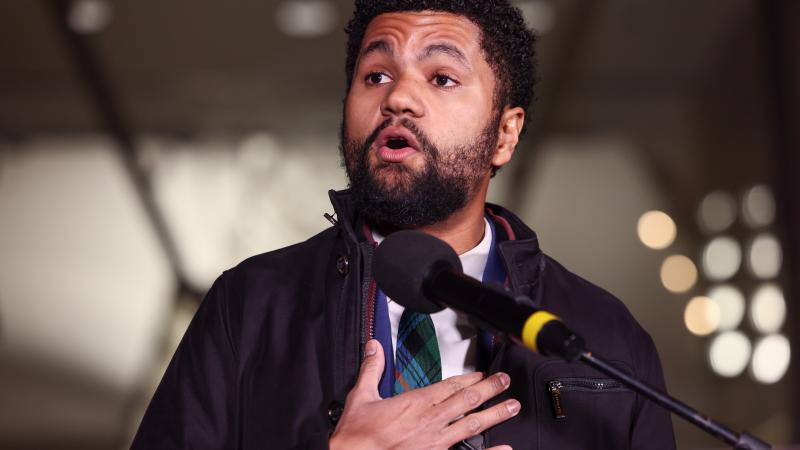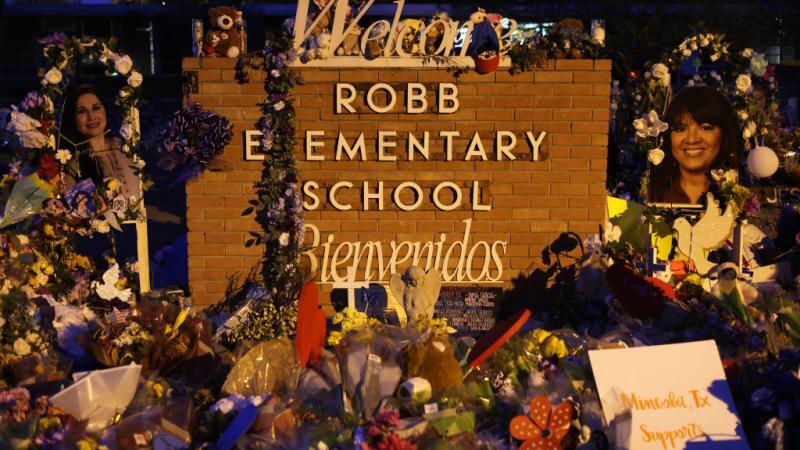Harris now on defensive over her, Biden’s foreign policy as Israel, Iran appear headed toward war
The Biden /Harris administration, in contrast to its predecessor, has largely sought a rapprochement -- if not appeasement -- with Tehran and worked for the restoration of the Iran Nuclear Deal. They are desperately trying to keep the heavily Islamic Democratic constituency of Michigan, a battleground state, on side.
As Iran and its proxies escalate their activities against American and Western interests, the Harris campaign now faces the daunting task of defending or walking back their record on Iran and policies that critics say have enabled Tehran to ramp up hostilities.
The administration, in contrast to its predecessor, has largely sought a rapprochement with Tehran and worked for the restoration of the Joint Comprehensive Plan of Action (JCPOA), or the Iran nuclear deal, which was a keynote item of the Obama-Biden administration.
To that end, they have pushed for easing of sanctions on the Islamic Republic, providing the regime with critical economic lifelines and resources to pursue its foreign ventures. Biden further de-listed the Iranian-aligned Houthi militants as a Foreign Terrorist Organization within his first month in office. Shortly thereafter, increased Houthi aggression forced the administration to issue a reversal in early 2024.
Radical Islamic operatives coming through porous US border
So far, the administration’s efforts appear to have done little to dissuade Iran from pursuing hostile actions against the U.S. and its aligned countries in the region. The Iranian proxy Hamas, last year, launched the murderous Oct. 7 raid that kicked off the ongoing conflict in the Gaza Strip. The Houthis, meanwhile, have significantly impeded maritime shipping through the Red Sea by attacking commercial and military vessels.
More recently, U.S. Customs and Border Protection warned its field offices that Iran might seek to insert its operatives into the U.S. interior through the border. That warning followed the arrest of Asif Raza Merchant, a Pakistani man charged with conspiring with Iran to assassinate former President Donald Trump. Earlier this week, moreover, the White House directly warned that Iran or its proxies may attack Iran this week.
Appeasement instead of deterrence
"So deterrence has been dismantled by the Biden administration in order to pursue appeasement,” Heritage Foundation Center for National Defense Director Robert Greenway said on the “Just the News, No Noise” television show on Tuesday. “And not only do we not have it, we're not taking the steps to restore it, because its capability, which we arguably have, everyone knows it, but the will to use it, and that is absolutely lacking, and Tehran is acting accordingly.”
Attacks by Iranian proxies against U.S. forces have totaled in the hundreds since October of last year. Greenway placed the figure at “220 if you count the attacks against us on a daily basis in the Red Sea.
The worsening security and geopolitical situations could present a problem for Harris, who has long highlighted her prominent role in the Biden-Harris administration, and is sure to come up in the Sept. 10 debate with former President Donald Trump.
Here’s a look at some of the key moves from the administration on Iran:
Biden/Harris' sanctions relief providing billions in cash
Reporting from the Daily Signal last October suggested that the Biden administration’s policy had provided Tehran with roughly $70 billion to which it would not have had access had Biden not reversed course from Trump’s “maximum pressure” campaign.
Of that, $52.2 billion came from expanded foreign purchases of Iranian oil as markets reacted to Biden’s rhetoric about loosening sanctions. Biden ultimately did not repeal the sanctions themselves, but the outlet’s estimate asserts that the discussion spurred market demand that would not have otherwise existed.
Heritage's Greenway, this month, suggested that the figure had continued to climb. “Our numbers actually put it at over $100 billion and that was earlier this year, so it's north of that,” he said. “There are some variables, but that's a safe place to be, and in the end, as long as we're providing the resources they're going to engage in regional terrorism, support their proxies and surrogates… and also, of course, their nuclear program.”
“So the access to resources completely predicates how much malignant behavior they're going to engage in, and we're seeing this on full display in real time. And as long as that's the case, it will continue,” he went on.
Prisoner swap, but a $6 billion sweetener for Iran
In September of 2023, the Biden administration reached an agreement with Tehran to secure the release of five Americans in Iranian custody in exchange for the same number of Iranians. Drawing scrutiny, however, was a provision in which the U.S. agreed to unfreeze $6 billion in Iranian funds that had been stuck in South Korea. The funds were a South Korean sum owed to Iran for the purchase of oil prior to the U.S. imposition of sanctions.
The prompted outrage from Republicans, including Trump, who called the arrangement “absolutely ridiculous” and slammed the president for what he said was setting a precedent of paying for hostages. Just weeks later, and perhaps funded by Biden's agreement, the Iranian proxy Hamas staged the bloody Oct. 7 raid on Israel that prompted the U.S. refreeze the assets.
The Jewish News Syndicate said that the reported death toll of more than 1,400 Israelis from Hamas terrorist attacks was proportional to about 48,300 American deaths on 9/11. The official U.S. count of Americans who died on Sept. 11, 2001 at the World Trade Center is 2,977.
The southern border crisis
The Biden administration’s border policies, meanwhile, have drawn scrutiny in connection amid fears that terrorist groups will take advantage of the security situation to infiltrate the U.S. interior.
“[E]ven prior to October 7, we knew that there were elements of Hamas here in the United States,” said former acting Department of Homeland Security Secretary Chad Wolf on the “John Solomon Reports” podcast. “And obviously that's probably been expanded over the last three and a half years, given what's going on along that southern border.”
He then warned that such cells could be “prone to actually activate and to do something, it's why they come here and go and spread across the world, is to be activated at the right time. So I think you've got to be really, really concerned about what's going on.”
He also pointed to the pro-Palestine movement that staged protests on college campuses and suggested that such activities could take a darker turn.
“You've got to really be concerned about the next step that that is going to take,” he said. “And I think a big part of this is when you have a lack of leadership in the White House, obviously, you have a president who's, you know, by all intents and purposes, not coherent most times of the day.”
“And then you have a sitting Vice President who is also really just not engaged on this issue very much. And so you have a lack of leadership at the highest level out there. So I think there's a lot of uncertainty,” Wolf concluded.
Speaking on the “Just the News, No Noise” television show on Wednesday, former Trump Deputy National Security Advisor Victoria Coates echoed Wolf, highlighting reports of terrorists entering the U.S.
“And the problem is we don't know how much Hezbollah is now in the United States,” she said. “We had another report of 99 folks on the terrorist watch list, which would include Hezbollah, who have been released into the United States. Those are the ones we know about.”
“It only took 12 on September 11, so we've got at least 99. How many gotaways are there that have come in, that are forming cells that are looking to attack?” she asked. ‘You know, we had the cancellation of the concerts in Vienna recently. I mean, that's the kind of thing that they're after. Are we prepared for that? I'm not sure we are. And especially if it's hardened, accomplished, well trained terrorists like Hezbollah operatives. We could have a real problem on our hands.”
Ironically, both Biden and Harris campaigned on a platform dead set against Trump's "border wall" with surrogates calling it "racist." Yet, the failures of their administration forced them to do an about-face and in 2023 announced according to The Texas Tribune, that the Biden administration would "press forward" with border wall plans in Texas established by President Trump.
Increase in Iran's nuclear program
The Office of Director of National Intelligence (ODNI) in July of this year provided Congress with an update on the status of Iran’s nuclear program and omitted a longstanding passage asserting that "Iran is not currently undertaking the key nuclear weapons-development activities necessary to produce a testable nuclear device.”
The update further asserted that "[t]here has been a notable increase this year in Iranian public statements about nuclear weapons, suggesting the topic is becoming less taboo.”
The development is a particular blow to the Biden administration in light of its efforts to restore the JCPOA, which had been intended to prevent Iran cultivation of a nuclear arsenal. Iran, the ODNI, asserted “is no longer constrained” by the agreement.
Greenway, for his part, took the omission of the previously ubiquitous line to suggested that the intelligence community had acquired tangible evidence of the Iranian nuclear weapons program moving forward.
“In this omission, what you what we can infer is that previously, they couldn't tell you that Iran had made a decision to pursue a weaponization program that is taking the enriched uranium, or in this case, potentially plutonium, and making it into a warhead that could be delivered by a missile,” he said. “And what they're saying in this omission is that the evidence is probably present that there is such a weaponization program, and the only reason you'd have it is that you're intent on making a weapon.”
“It's not a hobby, it's not a casual affair, it's not something you pursue as a safeguard. It's a deliberate decision, and the omission of the report reflects that, obviously they have evidence,” he went on. “They went to some pains to say that they don't know that the supreme leaders made a decision to pursue the weapon, but I think that's irrelevant when the preponderance of the facts support the conclusion that they are.”
Increasing fears of escalation in Mid-East
With Iranian proxies in Yemen, Lebanon, and Gaza seemingly running wild, possibly funded by Biden's easing of sanctions and Tehran’s advancing nuclear development, foreign affairs experts and industry veterans appear increasingly alarmed about the likelihood of a wider conflict.
Iran, in April, launched a direct attack on Israel, launching hundreds of missiles and drones at the country, though combined American and Israeli forces were able to shoot down most of them. The development stunned the international community and marked a considerable move in the direction of open war. On July 30, Hezbollah rockets sponsored by Lebanon rained death upon a Golan Heights soccer field occupied by children, 12 of whom were killed, according to the Associated Press.
Speaking on the “John Solomon Reports” podcast this week, former Director of the Office of Policy Planning at the U.S. Department of State Kiron Skinner insisted that the April attack was only a prelude to a wider conflict.
“[Y]ou've got an emboldened Iran that many people just a few years ago who studied the Middle East and have studied Iran, did not think it would be where it is now,” she said, in reference to Tehran’s attack. “It’s preparations for a bigger attack on Israel. The U.S.having to move forces into ships, into the Red Sea and the eastern Med[iterranean]. How many battlefields have I mentioned so far? And this touches so much of the world. It's not just contained to the Levant. It is a wider war already.”
Harris on defense at the podium
Between the alleged Iranian campaign hack and the conspiracy to assassinate Trump, Iran and the administration’s record is likely to be top of mind for the former president when he squares off with Harris in the Sept. 10 debate.
The vice president, for her part, has struggled to balance her own position, hoping to keep pro-Palestinian populations in key swing states placated while still maintaining official U.S. support for Israel. She has faced multiple demonstrations by anti-Israel activists in recent weeks as she has campaigned.
At the same time, Harris has still refused to take open questions from the press, and has not conducted any non-scripted interviews.
Republicans, for their part, have outright accused Harris of sympathizing with the Iranian proxy Hamas. Tennessee GOP Sen. Marsha Blackburn, for instance, said that "Kamala Harris is a Hamas sympathizer. She has made it crystal clear that she will stand with Hamas as the Jewish people are relentlessly attacked by Hamas terrorists.”
That avenue of criticism could potentially put Harris in the awkward position of either repudiating the interests of a key Democratic constituency, or attempting to advocate for civilian interests in Gaza while walking an ambiguous and thin line to avoid appearing supportive of Hamas, at the possible risk of alienating the heavily Islamic Democratic constituency of Michigan, a battleground state.
Ben Whedon is an editor and reporter for Just the News. Follow him on X.
The Facts Inside Our Reporter's Notebook
Links
- reversal
- warned its field offices
- conspiring with Iran to assassinate former President Donald Trump
- Iran or its proxies
- $70 billion
- secure the release of five Americans
- slammed the president
- refreeze the assets
- The Jewish News Syndicate
- Victoria Coates
- according to The Texas Tribune
- provided Congress with an update
- launched a direct attack
- according to the Associated Press
- struggled to balance
- Follow him on X















